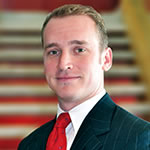In 2006, Parker White showed up to the airport with two suitcases and a one-way ticket to Shanghai. He had never been to China. He didn’t speak Mandarin. And he didn’t have friends or family in the region. Born and raised in Tennessee, White started working full time at the age of 16 and later found himself working in a sales role with a national residential developer at the height of the housing bubble. White saw the recession coming and wanted to gain international experience. After struggling to find an open position that didn’t require international work experience, he enrolled in a program that provided Chinese work visas.
In Shanghai, White got by on broken Mandarin and inexpensive meals of rice and street meat until he found a job as a commercial real estate broker for a global real estate services firm. Things were moving quickly, and managers put White on a team that developed a strategy for the first multitenant commercial development in China to implement a fledgling program that promised to cut costs and increase efficiencies—LEED.

JLL sustainability director Parker White
Fast-forward to 2014. White is a sustainability director for global professional services and investment management company JLL (formerly known as Jones Lang LaSalle) and vice president in its Smart Building division. He has improved his Mandarin, and in 2009, he partnered with environmentalist Peggy Liu to work with JUCCCE developing the official Energy Smart City management training curriculum delivered to China’s mayors as part of a mandatory leadership training program managed by the Chinese central government.
When conventional wisdom in the commercial real estate world said sustainability wasn’t worth pursuing in developing markets, White set out to prove that the opposite is true. In 2010, he started JLL’s energy and sustainability services (ESS) business in China and North Asia. In just three years, White grew his team from two people to six dedicated specialists supported by 15 engineers and 60 trained LEED professionals. The ESS team delivered two million square feet of LEED-certified real estate, $9 million in identified or achieved energy savings, and 20 megawatts in rooftop solar services.
They also tied 42 buildings into an advanced monitoring and reporting platform and applied a new approach to how buildings are treated. “We found success almost immediately,” White says, “because we treated a building like the ecosystem it is and worked closely with building vendors to ensure all systems were aligned.” Enlighted, Inc., for instance, provided intelligent sensors that collect energy consumption, occupancy, and environmental data while controlling light fixtures based on available ambient light and occupant preference.
Unlike other firms, JLL has in-house expertise to support global companies. “We have the ability to provide consistent quality standards in all locations, and our methods bring real results,” White says. Those results have been good for JLL, too; the ESS division doubled its business every year for the first three years and quickly turned a profit. “We’re not the first to try sustainability in China,” White says. “But we do it differently. We’ve actually created a model that turned into a viable business. Our competitors have remade their approach or left the region altogether. We’re staying.”
When industry analysts said sustainable businesses wouldn’t succeed in developing markets, White looked for unorthodox ways to make sustainability work. When he realized that increasing electricity costs in developing markets and supportive government regulations had set things in motion, he focused on creating energy services that would bring financial returns quickly. “The perception that energy services require a premium investment is a general misconception,” he says. Once he made a straight business case built on analysis of returns-on-investment, the ESS started to take off.
Although China’s economy is slowing, JLL continues to do well in the region as clients look to reduce costs and governments put requirements on clean energy. White’s ESS services are increasingly in demand.
Meanwhile, White has relocated to New York to develop solutions that support the company’s Smart Building business. The Smart Building division is still in its infancy, but White is working on projects like IntelliCommand, a software-as-service product that uses a cloud-based analytics platform integrated with on-the-ground facility management staff. Algorithms anticipate and address problems in commercial buildings before they arise. The system analyzes data on energy, lighting, heating, air-conditioning, ventilation, and cooling and allows for around-the-clock monitoring and controlling from a remote location.
Made for a scale that few companies other than JLL possess, the platform currently manages 6.6 billion points of data per year. “The amount of data generated by buildings is tremendous,” White says, “and the integration of that data with services and systems to deliver better performance is the future.”

